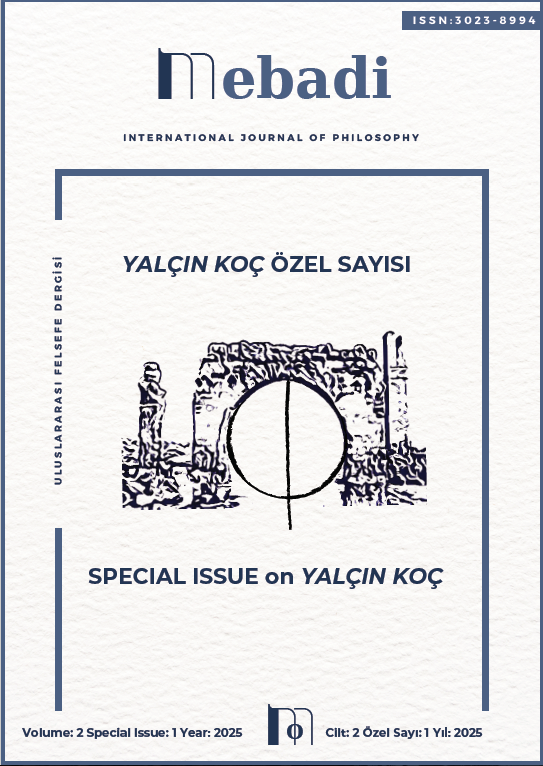Our December 2025 issue has been published.
Mebadi Vol. 2, Issue 2 of our journal mebadi for December 2025, has been published.

PREFACE
Now completing its second year, Mebadi: International Journal of Philosophy dedicates its very first special issue to a truly exceptional thinker: Yalçın Koç Born in 1950 in Tokat, Yalçın Koç graduated from the Department of Physics at Middle East Technical University in 1973. After teaching arithmetic for one year at a middle school during the 1973–74 academic year, he was appointed as a teaching assistant in the Faculty of Economics and Administrative Sciences of Middle East Technical University in 1976, to teach mathematics and logic. In 1977 he began working as an assistant in the Department of Philosophy at Boğaziçi University. In 1978, with his dissertation The Quantum-Mechanical Description of Nature and the Problem of Measurement, he received his doctorate in philosophy from the Department of Systematic Philosophy and Logic at Istanbul University’s Faculty of Letters. Koç became an associate professor in 1982 with his thesis Determinism and Space, and in 1988 he was promoted to full professor on the basis of his study The Significance of the Limitation on the Derivation of Bell Inequalities from Quantum Mechanics together with a research dossier on the logical structure of quantum mechanics. In addition to his teaching career at Boğaziçi University, he held a number of administrative posts, including Chair of the Department of Philosophy, Dean of the Faculty of Arts and Sciences, and Director of the Institute for Social Sciences. He retired in 1998 at the age of forty-eight. Koç now resides in a small village near Antalya, where he continues his philosophical work without interruption.
Why Yalçın Koç
Yalçın Koç is, in the truest sense of the word, an “essential” thinker—a philosopher who lays his hand upon the essence itself.
Within the stratified (architectonic) structure of language, he searches for the primordial (the first) layer, demonstrating—through the possibilities of language itself—that the primordial (Evvel) is the preeminent (evlâ), and thereby bringing being into conjunction with language. He articulates the metaphysical fissures of established Western philosophy by calling upon its own concepts as witnesses. Yet what you encounter in doing so is a tightly woven logical structure: one finds oneself, as it were, in a necessary, a priori medium akin to that of space and geometry. As he traces the path of the Evvel, Yalçın Koç profoundly unsettles the distinction between existence and essence. In revealing, one by one, the gaps between the stratified layers of language and being, he simultaneously effaces the “trace” (iz) and opens the horizon of a new one. Reading Koç, one encounters a philosophical attitude that both gestures toward “truth” and, within the bounds of philosophy/rationality, excludes the very attainability of that truth. The philosopher proceeds from the theoretical (nazari) in order to show the limits of the theoretical itself. He unites the voice of word/being with the breath of man. Thus, all theoretical density is suddenly transfigured into a practical phase. It is, of course, impossible to summarize the thought of Yalçın Koç—whose more than twenty works, we believe, have opened a new horizon for philosophical thinking in Turkey—in a few paragraphs; indeed, any attempt at condensation may risk distortion. Therefore, it is only proper to leave further elaboration to the distinguished authors who have contributed to the preperation of this issue. What makes this special issue even more special is that our esteemed scholar himself graciously accepted our invitation and contributed an article of his own. In his essay titled “Trans-finite and the Picturing of Turing Machines,” Professor Koç brings us face to face with a striking—and deeply contemporary—example of the human-centered practical philosophy mentioned above. For this, I wish to extend my sincere gratitude to Koç. All the articles included in this special issue are presented in both English and Turkish. For we are convinced that this philosophy transcends the intellectual boundaries of Turkey and deserves international discussion. Yet it is equally evident how difficult it is to translate an ontology so fundamentally grounded in language and concepts into another tongue. Hence, the presence of these texts in Turkish is not a matter of preference but of necessity. With the hope that this special issue will inspire fruitful philosophical discussions, I would like to express my sincere thanks to all our authors, reviewers, and editorial team for their contributions to the publication of this special issue.
Emin Çelebi
Editor-in-Chief
Prof. Dr. Emin Çelebi
Mebadi Vol. 2, Issue 2 of our journal mebadi for December 2025, has been published.
![]()
All articles published in our journal are licensed under the Creative Commons Attribution-NonCommercial 4.0 International License (CC BY-NC 4.0).
Journal Hosting, Support, and Customization by | OJSDergi.com
